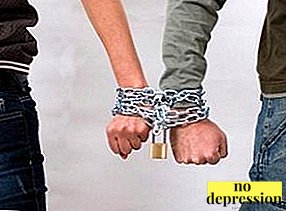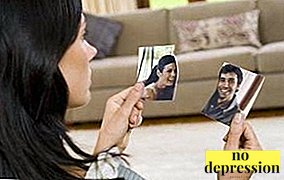In life, we often commit acts that can not be explained even to ourselves. For example, we break into a stranger for no reason. Or buy a new handbag instead of a down jacket. Meet - these are triggers or internal automata of our brain. They act in circumvention of common sense and willpower. But there is also good news: “automatic” actions or habits are not innate. And everything that we have gained in life can be changed.
What makes emotional and behavioral triggers work? How to resist advertising and what has the aroma of natural leather? What is the connection between a quarrel and a piece of cake? The article has answers to these questions and the TOP-5 most dangerous triggers that cause bad habits.
What is a trigger
A trigger is a trigger that drives a system. Initially served as a radio engineering term, but today it is more often used in psychotherapy, medical psychology and sales. In terms of psychology, triggers are external incentives (irritants) that cause automatic reactions of people. That is, the trigger temporarily turns off the mind and the person acts "on the machine". An external stimulus can be anything: a familiar smell or taste, a sound or a melody, a touch, an anecdote read, a message heard, or a telephone conversation.
In marketing and sales, triggers call psychological tricks motivating the buyer to take the necessary action for the seller Here and now. This magic mechanism imperceptibly, but confidently pushes customers into buying, participating in a lottery, subscription, large expenses. Marketing triggers affect the instincts and personality traits of a person, causing fear, panic, greed.
Depending on the reaction caused, external stimuli are of 2 types: emotional and behavioral. Emotional trigger re-launches memories of a person in the form of emotional reactions: anxiety, irritation, fear or pleasure, joy. Behavioral triggers are also called stimulating. They provoke a person to a certain action: behavior, purchase, decision.
How the trigger works
There are 4 points: trigger-pulse-behavior / action-consequences. That is, at the moment when the trigger is triggered, we have an impulse to perform certain actions. We act and only then realize the consequences. Consider the interaction of elements of the chain can be an example of a situation: a person is nervous and begins to eat candy. A trigger in this situation can be any irritant (unpleasant conversation with a colleague, for example). Immediately there is an impulse - get candy. Then unconscious behavior occurs - candy is eaten. Only then, when we see a mountain of candy wrappers, we begin to realize the consequences of such automatism.
Reacting to an external stimulus, the body starts an automatic chain of actions. This saves energy, time and mental potential. On the one hand, the action “on the automaton” eliminates the need to make identical decisions every minute. For example, to think every day: where to put the washed cup or how to brush your teeth. Automatic response allows our psyche not to overload. But such automatism has drawbacks. Actions on the machine increase the chances of making a mistake, go on about the bad habit, get under the influence of skilled manipulators.
Triggers have 2 features:
- Cyclicality. That is, the consequences do not help us to draw conclusions, and even more reinforces the automatic response.
- Neutrality. All that matters is our reaction. The same flavor, taste or sound of different people activates an individual explosion-package that can be used to harm or benefit.
As an example of a single trigger that led to unexpected consequences, you can consider the real story.
In one city, a bakery opened, selling delicious, fresh pastries. Over time, things went so well that the owners decided to update the interior of the bakery. We hired a designer and got down to business. But after the opening of the updated bakery, baking sales have plummeted. the number of visitors has not decreased, but they have become less. The flavors of baking, lucrative offers did not help.
Marketers conducted their own investigation and found the "weak link". It turned out that according to the designer’s idea, a large mirror was hung up to its full height near the cashier's desk. Waiting for their turn, sweet lovers considered themselves and ... refused to buy. That is, made a choice in favor of a slim figure.
The mirror was thus a neutral behavioral trigger: unsuccessful for sales, but useful for fans of sweets.
How triggers in stores make us spend more
According to statistics, consumer spending before the New Year and Christmas increases by 50-60%. And no wonder. Mountains of gifts on the shelves, fun music, pre-holiday rush, discounts, promotions - part of a thought-out advertising campaign of sellers. All marketing triggers work to force the buyer to spend more, buy an unnecessary thing, or something that he cannot afford at other times of the year.
What else do sellers use?
- Free gifts to increase sympathy.
- Limited series for the effect of unavailability.
- Opinion professionals to maintain credibility.
- Different price tags on the same products to create the illusion of choice.
- Intriguing product announcements for the anticipation effect.
- Elite offers to enhance self-worth.
Shops often use fragrances to create desire and the right reactions. And there is even a special rating of the most effective odors: natural leather, baby powder, pastries, coffee or chocolate. But all of them are another part of a marketing campaign that feeds buyers for money.
Studies have shown that people tend to respond to the situation meaningfully in cases where they have 2 resources: desire and time. In the case of haste or unwillingness to understand anything, the "automaton" is turned on.
For example, an artificially created rush activates the most powerful triggers: panic, fear. This is often used not only by sellers ("action only one day"), but also by fraudsters. For example, they send an alert to the phone, and then in a hurry, they force the subscriber to transfer money to the desired account. When we do not want to understand the information received, we stop trusting ourselves, so we rely on the opinions of others. For example, we consider expensive wine more delicious. We regard a person in an expensive suit as successful, we trust him much more than untidily dressed.
It seems there is a right decision: realize your trigger and stop it in time. But this is just in theory. In practice, we are excellent strategists, but bad performers. In order to withstand the marketing triggers, the usual care and desire to see what lies behind the calls is enough. But for the global struggle with the mechanisms of launching bad habits, it will be necessary to pump out will power.
How to get rid of personal triggers that prevent to become better
Our main enemy of change is habitat. This is a non-stop trigger that is constantly changing and throwing us all new stimuli. But to change it is not necessary to move to another city or switch to a new job. If we carefully analyze the environment, we will be able to develop the correct reactions to our stimuli.
In our desire to change, we underestimate the strength of our triggers and overestimate our strength of will. Therefore, our internal strategist will have to argue with laziness, settle the conflict with the “internal leader”, develop the muscles of self-control and self-control.
For starters, you can learn about the five most common triggers that trigger bad habits.
Time.
Situation. As soon as a free minute falls at work, smokers gather in a smoking-room, coffee-makers rush to brew coffee, and sweets get a cherished chocolate bar. And so several times a day.
Solution: for a change, take time with something useful. If you have a free minute at work - take a walk, stretch your legs. Switch from routine homework, not to just watching social networks, but to live chat with friends.
A place
Situation. After work, you go to a supermarket that smells like pastries. You immediately go to the window with sweets and buy everything. Bring the purchase home and eat - after all, the sweet is already at home.
Solution: instead of the supermarket go to the fitness room. If you go to fitness after work, you can kill two birds with one stone: pull up your body and leave the habit of eating sweets for the night. After all, after a workout to go to the store no longer want.
Previous events
Situation. The manager said you are a bad worker. You came home, heard the words of his wife about a crooked shelf. The edge of consciousness clings to the word "bad", complements the chain "bad husband" and the family scandal is assured.
Solution: do not take the part for the whole. If any word has "scratched" you, do not rush to throw out all the outrage at the same time on your interlocutor. Instead of angry preaching, try switching and finding out the relationship in a more relaxed state.
Emotional condition
Situation. Do not go sales in business? We'll have to forget about the decision to quit smoking. Birthday friend? You can allow yourself to eat a piece of cake, although I gave myself the word not to eat the sweet afternoon.
Solution: stop and think. Emotional switches are so strong that they "cut down" the mind instantly. We'll have to learn to track and stop their reactions in time. You can do a dozen slow breaths, and thus "breathe" to self-control.
Environment
Situation. You want to go relax on a fashionable resort and go into austerity. But you meet a girlfriend with whom you always go shopping. And all the money saved was spent on shoes, blouses, and bijoux.
Solution: chat with people who have already rested at this resort. Impressions of people will give you the positive, which is not enough during the economy. And additionally - will increase motivation for savings.
Triggers of bad habits are much more effective than beneficial ones. Get rid of them hard. To change something, you have to spend a lot of time trying to change something. But there is some good news: the more often you notice your triggers and pause before the action, the easier it will be to develop good habits. A good trigger is a powerful weapon. Therefore, it is worth spending time and energy on it.
findings
- A trigger is a trigger that forces us to act in a certain way.
- The triggers themselves are neutral. The main result of the action is our reaction.
- Competently placed sales triggers help launch the right state at the right time and lead the visitor to the main action - the purchase.
- Unwillingness to understand the situation makes us a target for manipulators.
- The features of our psyche are such that we better remember negative events and experiences. Therefore, emotional stimuli often trigger traumatic memories.
- If you catch your reaction at the right time, you can direct the energy towards improvement.
- We cannot choose situations or environments, but we can correct our reaction to stimuli.



